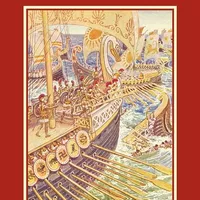48. The Triumph of Rome
" 'Tis Greece, but living Greece no more." —BYRON.
Rome had conquered Carthage. Where the busy Phœnicians had lived and thriven for five hundred years, Romans now pastured the herds of their distant masters. Roman merchants flocked across the seas to this new Roman province, called now—for the first time in history—Africa.
Flushed with her victories here, she turned her eyes towards Greece—toward the country, which Alexander the Great had made so strong, but which was now crumbling into decay, under one Perseus.
The Romans now chose one of their consuls, the brother-in-law of the dead Scipio, to march against Macedonia. That kingdom once subdued, they knew that Greece would soon fall under their sway.
There is a quaint old story about this brother-in-law of the great Scipio. His name was Paulus, the Roman word for Paul. He had just been chosen general of the Roman troops, and was coming home when he met his little daughter weeping bitterly.
"What is the matter?" he asked, drawing the child to him.
Throwing her arms round his neck and kissing him, she cried, "O father, do you not know that Perseus is dead?" Paulus must have wished the news was true, with regard to the enemy, against whom, he was so soon to march; but the little girl was crying over the death of a favourite dog, named Perseus, and her father could only kiss her, saying, "Good fortune, my little daughter, I accept the omen." So Paulus went off to the wars, and it was not long before the news reached Rome, that he had conquered the Macedonians, and was bringing back Perseus as a prisoner. He sailed up the river Tiber in the king's galley, with its sixteen banks of oars. It was richly adorned with arms captured from the Greeks, with cloths of purple and scarlet. As the vessel was rowed slowly against the stream, the Romans crowded on the shore to meet him. And the Romans decreed a triumph for the conqueror—a triumph, which lasted three days, the like of which had never been seen before. The people erected scaffolds in the Forum and dressed themselves in white.
On the first day two hundred and fifty chariots passed through the streets, with the beautiful statues, pictures, and colossal images, which had been brought from Greece, the home of art and beauty.
On the second day, waggons carried the magnificent armour of the Macedonians, all polished and glittering. There were shields and coats of mail, targets, quivers of arrows, and naked swords all piled up in confusion. After the waggons came three thousand men carrying seven hundred and fifty vessels of silver, while others followed with silver bowls and cups—all of which impressed the Romans very much.
But for the third day, was reserved the greatest triumph of all. Quite early in the morning, the trumpeters sounded, and a number of young Romans appeared, wearing frocks with ornamented borders and leading one hundred and twenty oxen with their horns gilded and adorned with ribbons and garlands, to be sacrificed. Then came all the gold plate, that had been used at the table of the king of rich Macedonia, followed by the chariot of Perseus himself, in which lay his armour and his crown.
A sight followed that drew tears from the eyes of the Roman crowd. The king's three little children were led captives, surrounded by a train of attendants, masters, and teachers, all stretching out their hands to the spectators and entreating pity. Perseus himself followed, clad all in black and "wearing the boots of his country"; he looked like one stunned, through the greatness of his misfortunes. A number of his friends, sobbing with grief, followed.
Then came Paulus himself, seated on a magnificent chariot. He was an old man and worthy to be looked at, in his purple robe interwoven with gold, holding a laurel branch in his right hand. The whole Roman army followed with boughs of laurel in their hands, singing verses and songs of triumph in praise of the deeds of Paulus. And this ended the great procession.
So Greece became subject to the ever-growing power of Rome, and she has never returned to the pinnacle of glory that once made her the chief nation in the Old World.

